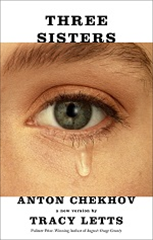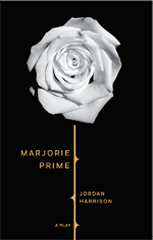Unbiased reviews for plays are written in exchange for hard copies. Theatre Communications Group has kindly forwarded Three Sisters by Chekhov and adapted by Tracy Letts, and Marjorie Prime by Jordan Harrison to The New England Theatre Geek.
Reviews by Kitty Drexel

Three Sisters
By Anton Chekhov, adapted by Tracy Letts
Theatre Communications Group
New York, NY
December 2016
$14.95
(NYC) Tracy Letts’ adaptation of Anton Chekhov’s Three Sisters is the dramatic literature equivalent of the “Google Translate Sings: ‘One Day More’ from Les Miserables” parody. It’s not accurate, but it’s not entirely incorrect either. The majority of the content is Chekhov’s original. Letts expresses it in new and festive ways.
Natasha, Olga, and Masha Prozorov just want to go to Moscow. They have different reasons for returning to their childhood home but their goal is the same: return. Their brother Andrey likes it in the country. In three acts, three different women face the unrequited admissions of affection from men. Their idealistic expectations are questioned. Life hits them hard right in their pampered, over-educated wallets. They do not return to Moscow.
Letts takes great liberties to modernize Three Sisters. It’s a treatment usually reserved for Shakespeare. Characters use slang, make fart jokes, and even use a cell phone. 19th Century habits and social mannerisms are dropped for far more casual behaviors. There’s a lot of back and forth, farce-like entering and exiting of rooms on a whim. These updates will horrify purists. The rest of us will have quite a bit of fun reading and performing.
Chekhov’s characters aren’t quite enough for a modern update. The resemblances between women, poets, etc. are too similar. It’s why Christopher Durang’s Vanya, Sonia, Masha & Spike works so well as a parody. That being said, Letts draws upon Three Sisters potential. His adaptation is an exercise in possibility.
It will horrify purists. It’s great. The attitudes and behaviors aren’t quite universal enough for modern settings but Lett’s adaptation is an interesting exercise in possibility.
Tracy Letts is a playwright, actor, and resident company member of Steppenwolf Theatre Company. He was awarded the Pulitzer Prize for Drama for August: Osage County.
 Marjorie Prime
Marjorie Prime
Jordan Harrison
Theatre Communications Group (TCG)
New York, NY
December 2016
$14.95
Marjorie Prime is science fiction drama about identity, immortality, and aging. A “Prime” is an artificial intelligence sympathy android engineered to ease transitions into death for the dying and the mourning. Primes are designed to look like people, but they are not people. They are similar to adult versions of David, the mecha child from the 2001 Spielberg film, A.I. Artificial Intelligence.
Marjorie is dying. Her memories are slowly being eaten away by dementia. Walter Prime, who looks like her late husband, is introduced to the family to comfort Marjorie in her last days. He records and repeats memories like Walter. When Marjorie dies, Marjorie Prime is introduced to daughter Tess and son-in-law Jon. Marjorie Prime questions what it means to be alive. Are we more than just our thoughts and experiences. Do the composite life recordings of androids entitle them to personhood?
Harrison is a tricky bastard. He gives us fully fleshed characters that we care about even if we don’t like them very much. Harrison makes us love them, and then he takes them away. He replaces them with Primes. The Primes look and act like the origin character but are soulless. We must adapt just like his characters must adapt. It’s nearly unfair of him – to have us emotionally invest, and to then betray us. It teaches us a lesson in identity permanence, technological evolution, and emotional greed.
This is a relatively simple play to stage. It requires one set and four adult actors: one senior, three middle-aged. Marjorie Prime has been adapted into a movie starring Jon Hamm, super feminist Geena Davis, Lois Smith, and Tim Robbins. It will be released in 2017.
Jordan Harrison’s plays include Maple and Vine, The Grown-Up, Doris to Darlene, Amazons and Their Men, Finn in the Underworld, Act a Lady, Kid-Simple, and Futura. Harrison is the recipient of a Guggenheim Fellowship, a Hodder Fellowship, the Kesselring Prize, and the Horton Foote Prize, among other awards. Harrison is a writer-producer for the Netflix original series Orange is the New Black.
Queen’s Note:
we elected a thin-skinned bigot to the office of the President dead set on turning our “democracy” into a fascist, totalitarian oligarchy dominated by the 1%. His plan to slash the National Endowment for the Arts and the National Endowment for Humanities is HERE. Trump is a monster. His policies, when he names them, are destructive. His narcissistic behavior is more so. Fight him. And, for the love of all that’s sacred, keep creating. If you need help, ask for it. Our existence is our resistance. May the force be with you. – KD
Sign the petition to protect the National Endowment HERE.
#blacklivesmatter #translivesmatter #brownlivesmatter #yellowlivesmatter #lgbtqialivesmatter #immigrantlivesmatter #muslimlivesmatter #disabledlivesmatter #theatreartsmatter #NODAPL
